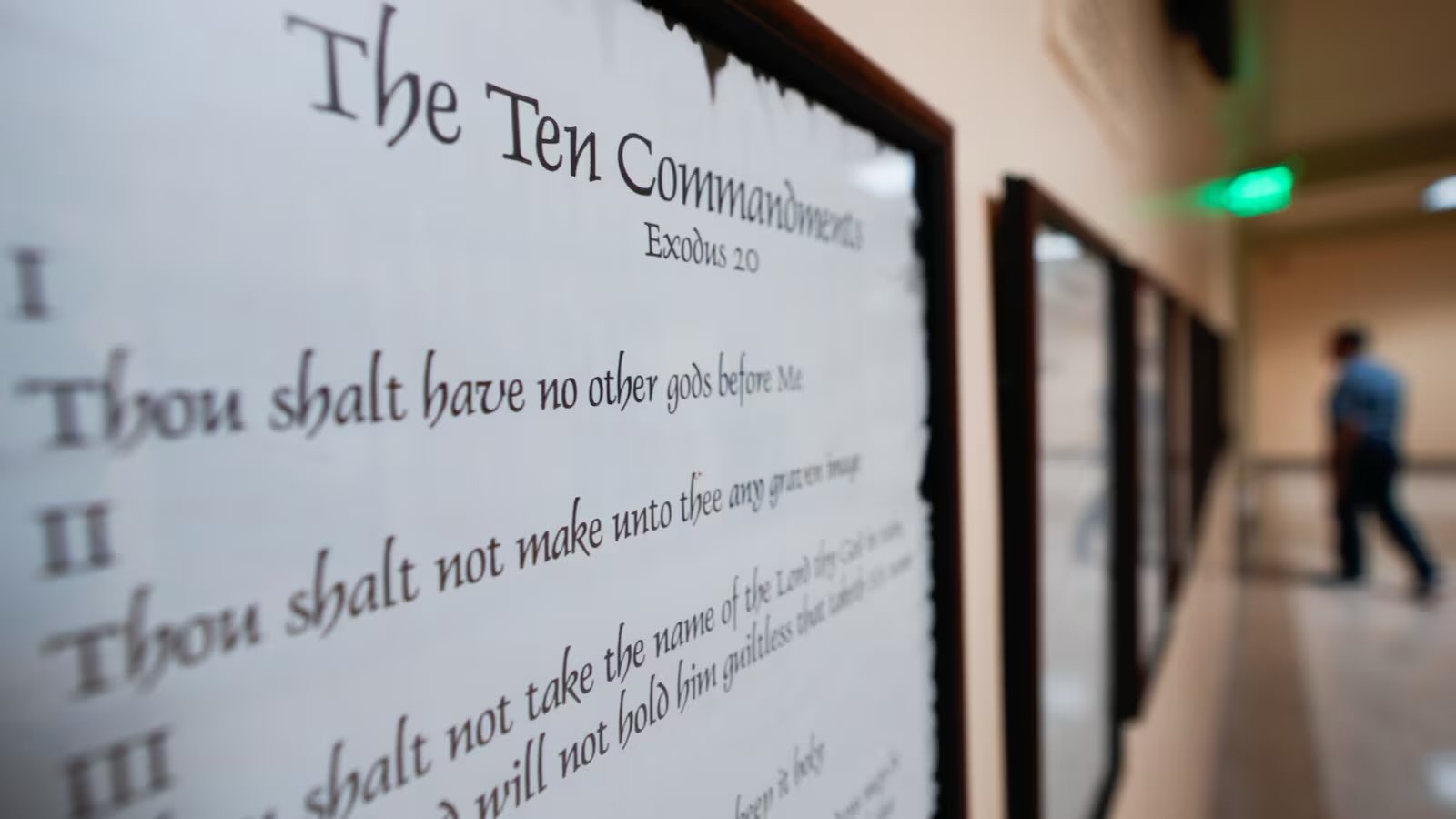Eighteen states have voiced their support for Louisiana’s controversial law requiring public schools to display the Ten Commandments prominently in classrooms. The legislation mandates that the religious text be posted in a “large, easily readable font,” igniting a nationwide debate over the separation of church and state.
Louisiana’s law, which passed earlier this year, argues that the Ten Commandments hold historical significance and reflect moral values foundational to American society. Supporters say the display promotes ethics and discipline among students, while critics view it as a direct violation of constitutional protections against government-endorsed religion.
Attorney General Jeff Landry of Louisiana praised the backing from the coalition of states, calling it a victory for “faith, freedom, and tradition.” Among the 18 states showing support are Texas, Mississippi, and Oklahoma, whose leaders have echoed Louisiana’s arguments about the Ten Commandments' role in American history.
Supporters Cite Historical Significance
Proponents of the law argue that displaying the Ten Commandments serves as a cultural and historical reference rather than an endorsement of religion. They contend that the commandments are foundational principles that have shaped the moral framework of the nation.
“Public schools should honor America’s moral and historical roots,” Landry said in a statement. “The Ten Commandments are an undeniable part of our heritage, and students have a right to know their importance.”
Supporters further argue that schools display other historical documents, like the Constitution and the Declaration of Independence, without controversy. They believe that excluding the Ten Commandments amounts to selective censorship.
However, legal experts say the law is likely to face significant challenges in court. The Supreme Court has previously struck down similar measures, ruling that such displays in public schools violate the Establishment Clause of the First Amendment.
Critics Warn of Constitutional Violations
Opponents of the law maintain that it breaches the principle of separation of church and state. Civil liberties groups argue that requiring the Ten Commandments in classrooms imposes religious ideals on public school students, many of whom may not share the same beliefs.
“Public schools are not churches,” said Sarah Montgomery, a spokesperson for the ACLU. “This law undermines the constitutional rights of students by forcing religion into the classroom.”
Critics also argue that the measure alienates non-Christian students and families, fostering division instead of unity.
Social Media Reactions Intensify Debate
The law has sparked heated conversations across social media platforms, with users taking strong stances both for and against the measure.
User @FaithFirstUSA tweeted, “Finally, a win for tradition and morals in our schools! America needs more of this.”
Conversely, @RightsForAll posted, “This is unconstitutional and dangerous. Keep religion out of public schools. Period.”
Supporter @HeritageMatters wrote, “The Ten Commandments are part of history, not just religion. Schools should teach moral values.”
Meanwhile, @StopTheViolation argued, “This is a blatant violation of church and state. Lawsuits are coming, and they will win.”
User @CommonSensePatriot commented, “If schools teach history, the Ten Commandments belong there. It’s not forcing anyone to believe.”
Critic @ThinkProgressUSA tweeted, “This law divides students and ignores the Constitution. It’s a step backward for education.”
Legal Challenges on the Horizon
While Louisiana’s law enjoys growing support from other conservative-led states, its future remains uncertain. Legal challenges are expected, with opponents confident that courts will strike it down based on previous rulings.
The battle over the Ten Commandments in classrooms highlights the ongoing tension between religious expression and constitutional protections. For now, the law’s supporters remain steadfast, framing the issue as a defense of values and history in American education.



 India–U.S. Interim Trade Pact Cuts Auto Tariffs but Leaves Tesla Out
India–U.S. Interim Trade Pact Cuts Auto Tariffs but Leaves Tesla Out  New York Judge Orders Redrawing of GOP-Held Congressional District
New York Judge Orders Redrawing of GOP-Held Congressional District  Iran–U.S. Nuclear Talks in Oman Face Major Hurdles Amid Rising Regional Tensions
Iran–U.S. Nuclear Talks in Oman Face Major Hurdles Amid Rising Regional Tensions  Trump’s Inflation Claims Clash With Voters’ Cost-of-Living Reality
Trump’s Inflation Claims Clash With Voters’ Cost-of-Living Reality  Netanyahu to Meet Trump in Washington as Iran Nuclear Talks Intensify
Netanyahu to Meet Trump in Washington as Iran Nuclear Talks Intensify  US Pushes Ukraine-Russia Peace Talks Before Summer Amid Escalating Attacks
US Pushes Ukraine-Russia Peace Talks Before Summer Amid Escalating Attacks  Newly Released DOJ Epstein Files Expose High-Profile Connections Across Politics and Business
Newly Released DOJ Epstein Files Expose High-Profile Connections Across Politics and Business  Norway Opens Corruption Probe Into Former PM and Nobel Committee Chair Thorbjoern Jagland Over Epstein Links
Norway Opens Corruption Probe Into Former PM and Nobel Committee Chair Thorbjoern Jagland Over Epstein Links  Trump Signs “America First Arms Transfer Strategy” to Prioritize U.S. Weapons Sales
Trump Signs “America First Arms Transfer Strategy” to Prioritize U.S. Weapons Sales  Panama Supreme Court Voids CK Hutchison Port Concessions, Raising Geopolitical and Trade Concerns
Panama Supreme Court Voids CK Hutchison Port Concessions, Raising Geopolitical and Trade Concerns  Court Allows Expert Testimony Linking Johnson & Johnson Talc Products to Ovarian Cancer
Court Allows Expert Testimony Linking Johnson & Johnson Talc Products to Ovarian Cancer  Nighttime Shelling Causes Serious Damage in Russia’s Belgorod Region Near Ukraine Border
Nighttime Shelling Causes Serious Damage in Russia’s Belgorod Region Near Ukraine Border  Federal Judge Rules Trump Administration Unlawfully Halted EV Charger Funding
Federal Judge Rules Trump Administration Unlawfully Halted EV Charger Funding  Trump Allegedly Sought Airport, Penn Station Renaming in Exchange for Hudson River Tunnel Funding
Trump Allegedly Sought Airport, Penn Station Renaming in Exchange for Hudson River Tunnel Funding  Meta Faces Lawsuit Over Alleged Approval of AI Chatbots Allowing Sexual Interactions With Minors
Meta Faces Lawsuit Over Alleged Approval of AI Chatbots Allowing Sexual Interactions With Minors  Missouri Judge Dismisses Lawsuit Challenging Starbucks’ Diversity and Inclusion Policies
Missouri Judge Dismisses Lawsuit Challenging Starbucks’ Diversity and Inclusion Policies  Uber Ordered to Pay $8.5 Million in Bellwether Sexual Assault Lawsuit
Uber Ordered to Pay $8.5 Million in Bellwether Sexual Assault Lawsuit 































